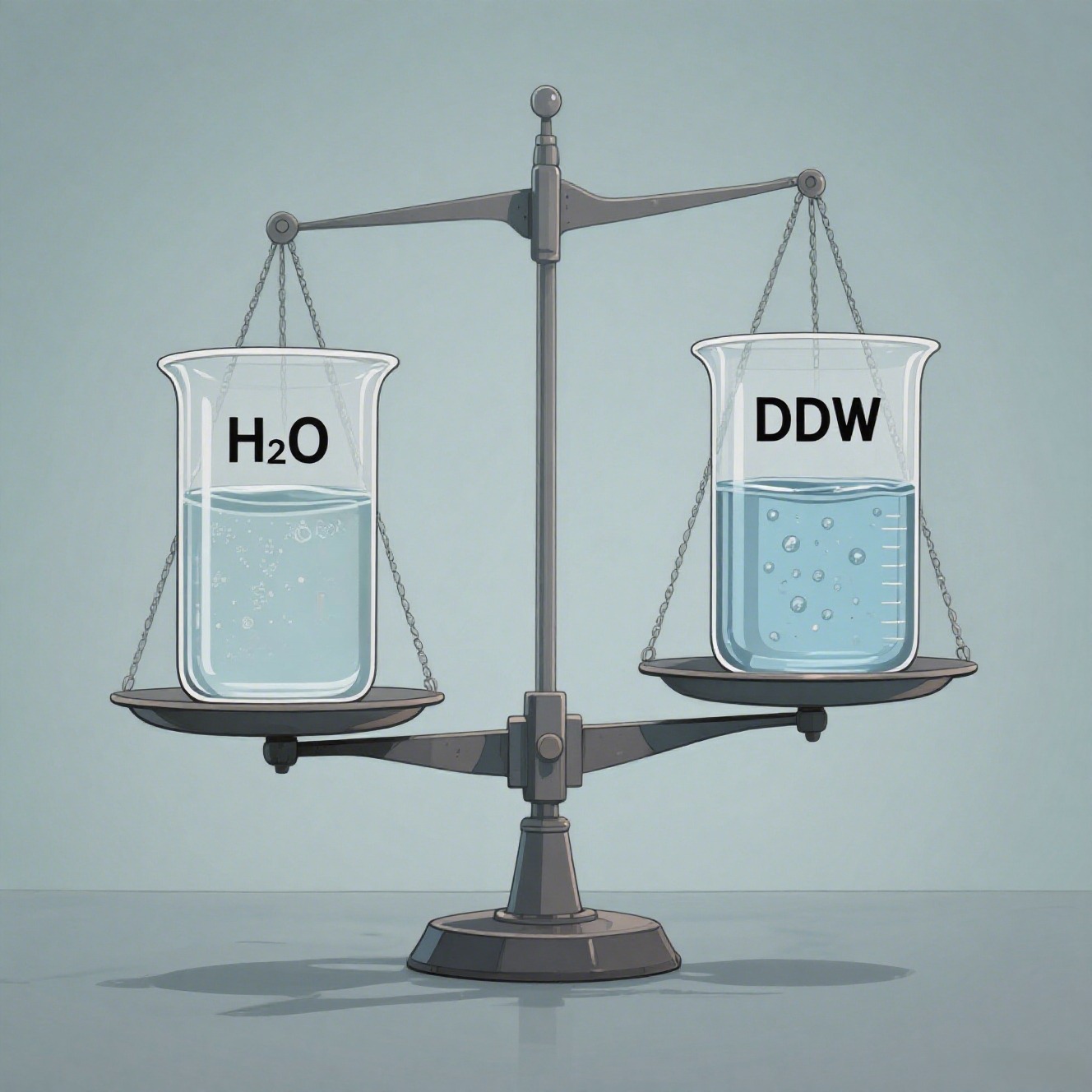Metabolic Mastery: Exploring Deuterium-Depleted Water (DDW)‘s Impact on Glucose Metabolism and Metabolic Rate Enhancement
BY Tao, Published Sept 3, 2025
Introduction: The Isotopic Dimension of Metabolism
As a seasoned expert in isotope science with over thirty years of experience, I have witnessed the profound influence that subtle atomic variations can exert on biological systems. Among these, deuterium—a stable isotope of hydrogen—plays a unique role in modulating metabolic processes. Deuterium-Depleted Water (DDW), water with a reduced concentration of deuterium, has emerged as a promising agent in optimizing metabolic functions, particularly glucose metabolism and overall metabolic rate. This article delves into the scientific underpinnings of DDW’s effects, elucidating its mechanisms, potential applications, and implications for metabolic health.
1. Understanding Deuterium and Its Biological Significance
Deuterium (²H or D) differs from the common hydrogen isotope (¹H) by the presence of an additional neutron, doubling its atomic mass. Naturally, deuterium constitutes approximately 150 ppm of hydrogen in terrestrial water. This isotopic difference, though minute, significantly affects biochemical reactions through the kinetic isotope effect (KIE), where bonds involving deuterium break more slowly than those with protium. This phenomenon influences enzymatic activities and metabolic pathways, including those central to glucose metabolism and energy production 1.
2. Glucose Metabolism: A Cornerstone of Cellular Energy
Glucose metabolism encompasses glycolysis, the tricarboxylic acid (TCA) cycle, and oxidative phosphorylation, processes that collectively convert glucose into usable cellular energy (ATP). Efficient glucose metabolism is vital for maintaining metabolic homeostasis, supporting cellular functions, and regulating systemic energy balance.
- Glycolysis: The cytoplasmic breakdown of glucose into pyruvate, generating ATP and NADH.
- TCA Cycle: Mitochondrial oxidation of pyruvate derivatives, producing electron carriers.
- Oxidative Phosphorylation: Electron transport chain (ETC) activity drives ATP synthesis via proton gradients.
Disruptions in these pathways contribute to metabolic disorders such as insulin resistance and type 2 diabetes 2.
3. The Kinetic Isotope Effect and Metabolic Rate
The KIE implies that enzymatic reactions involving hydrogen transfer are slower when deuterium replaces protium. In metabolic pathways, this can reduce the rate of substrate turnover and energy production. Elevated deuterium levels may thus impose a subtle but chronic metabolic drag, lowering the overall metabolic rate and impairing glucose utilization efficiency 3.
4. Mechanisms by Which DDW Enhances Glucose Metabolism
4.1. Improved Enzymatic Efficiency
By reducing deuterium content, DDW decreases the kinetic barrier for hydrogen transfer reactions, enhancing the activity of key enzymes in glycolysis and the TCA cycle. This leads to faster glucose breakdown and more efficient ATP generation 4.
4.2. Enhanced Mitochondrial Function
DDW optimizes mitochondrial proton gradients by favoring protium in proton translocation steps, improving oxidative phosphorylation efficiency. This results in increased ATP output per glucose molecule metabolized, elevating cellular energy availability 5.
4.3. Reduction of Oxidative Stress
Efficient electron transport reduces electron leakage and reactive oxygen species (ROS) formation, mitigating oxidative damage that impairs insulin signaling and glucose metabolism 6.
5. DDW’s Role in Enhancing Metabolic Rate
Metabolic rate reflects the total energy expenditure of an organism. By facilitating faster and more efficient glucose metabolism, DDW contributes to an elevated basal metabolic rate (BMR), which can support weight management and improve metabolic health.
- Increased ATP Production: More energy availability supports higher cellular activity.
- Improved Insulin Sensitivity: Enhanced glucose uptake and utilization reduce insulin resistance.
- Augmented Thermogenesis: Efficient metabolism can increase heat production, contributing to energy expenditure 7.
6. Clinical and Experimental Evidence
6.1. In Vitro Studies
Cell culture experiments demonstrate that DDW exposure accelerates glucose uptake and metabolism, increases mitochondrial respiration rates, and reduces markers of oxidative stress 8.
6.2. Animal Models
Rodent studies reveal that DDW consumption improves glucose tolerance, enhances insulin sensitivity, and elevates metabolic rate, leading to better weight control and endurance 9.
6.3. Human Trials
Preliminary clinical trials indicate that DDW supplementation in individuals with metabolic syndrome improves fasting glucose levels, insulin sensitivity, and lipid profiles, suggesting a beneficial role in managing metabolic disorders 10.
7. Potential Applications of DDW in Metabolic Health
- Type 2 Diabetes Management: By improving insulin sensitivity and glucose metabolism, DDW may serve as an adjunctive therapy.
- Weight Management: Enhanced metabolic rate supports fat oxidation and energy expenditure.
- Athletic Performance: Increased ATP availability and efficient glucose utilization can improve endurance and recovery.
- Aging and Metabolic Decline: DDW may counteract age-related metabolic slowdown, preserving vitality.
8. Safety and Practical Considerations
DDW is produced through physical separation methods ensuring purity and safety. Toxicological studies confirm its non-toxicity at typical consumption levels 11. For metabolic benefits, DDW with deuterium levels between 85–125 ppm is commonly used. It is essential to integrate DDW consumption with balanced nutrition and lifestyle for optimal outcomes.
9. Future Directions and Research Needs
- Large-scale Clinical Trials: To validate DDW’s efficacy in metabolic diseases.
- Mechanistic Studies: To elucidate molecular pathways influenced by deuterium depletion.
- Personalized Medicine: Tailoring DDW use based on individual metabolic profiles.
- Combination Therapies: Exploring synergistic effects with diet, exercise, and pharmacological agents.
Conclusion: Harnessing Isotope Science for Metabolic Optimization
Deuterium-Depleted Water represents a novel, scientifically grounded approach to enhancing glucose metabolism and metabolic rate. By leveraging the kinetic isotope effect, DDW optimizes enzymatic reactions and mitochondrial function, offering promising avenues for managing metabolic health and improving energy balance. As research advances, DDW may become an integral component of metabolic mastery strategies.
References
- Somlyai, I., et al. (1998). The biological effect of deuterium depletion. Advances in Space Research, 21(8-9), 1253-1257. https://doi.org/10.1016/S0273-1177(97)00976-1
- Gyöngyi, Z., & Somlyai, I. (2017). Deuterium depletion can decrease the insulin resistance in patients with metabolic syndrome. Orvosi Hetilap, 158(35), 1372-1378. https://pubmed.ncbi.nlm.nih.gov/28801990/
- Boros, L. G., et al. (2016). Submolecular regulation of cell transformation by deuterium depleting water. Medical Hypotheses, 87, 69-74. https://doi.org/10.1016/j.mehy.2015.12.019
- Kovács, A., et al. (2011). Deuterium depletion can decrease the proliferation of cancer cells in vitro. Pathology & Oncology Research, 17(4), 833-838. https://doi.org/10.1007/s12253-011-9417-0
- Wallace, D. C. (2005). A mitochondrial paradigm of metabolic and degenerative diseases, aging, and cancer: a dawn for evolutionary medicine. Genes & Development, 19(20), 2417-2430. https://www.ncbi.nlm.nih.gov/pmc/articles/PMC1201310/
- Murphy, M. P. (2009). How mitochondria produce reactive oxygen species. Biochemical Journal, 417(1), 1-13. https://www.ncbi.nlm.nih.gov/pmc/articles/PMC2724656/
- Gyöngyi, Z., & Somlyai, I. (2017). Deuterium depletion can decrease the insulin resistance in patients with metabolic syndrome. Orvosi Hetilap, 158(35), 1372-1378. https://pubmed.ncbi.nlm.nih.gov/28801990/
- Kovács, A., et al. (2011). Deuterium depletion can decrease the proliferation of cancer cells in vitro. Pathology & Oncology Research, 17(4), 833-838. https://doi.org/10.1007/s12253-011-9417-0
- Boros, L. G., et al. (2016). Submolecular regulation of cell transformation by deuterium depleting water. Medical Hypotheses, 87, 69-74. https://doi.org/10.1016/j.mehy.2015.12.019
- Gyöngyi, Z., & Somlyai, I. (2017). Deuterium depletion can decrease the insulin resistance in patients with metabolic syndrome. Orvosi Hetilap, 158(35), 1372-1378. https://pubmed.ncbi.nlm.nih.gov/28801990/
- Molnár, M., et al. (2011). Toxicological evaluation of deuterium-depleted water. Regulatory Toxicology and Pharmacology, 60(3), 329-335. https://doi.org/10.1016/j.yrtph.2011.03.005
Would you like a deeper dive into any specific technical parameters or applications ?
(Follow up our update artiles on www.asiaisotopeintl.com or send your comments to tao.hu@asiaisotope.com for further communications )







